人教版必修5Unit3 Life in the future课文学案
- 格式:doc
- 大小:39.50 KB
- 文档页数:4
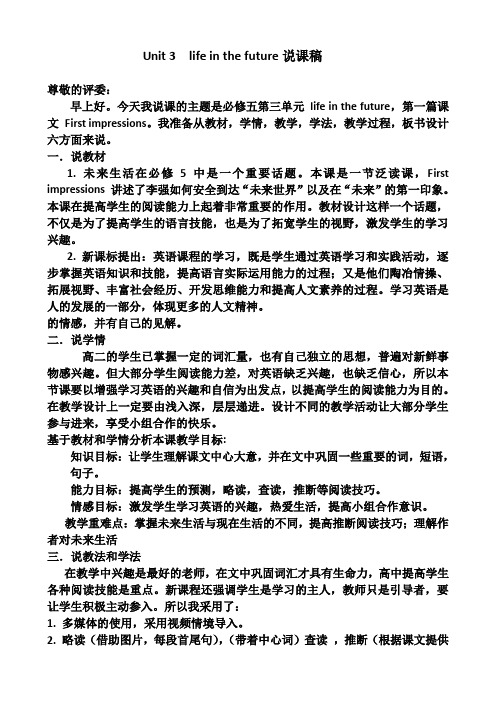
Unit 3 life in the future说课稿尊敬的评委:早上好。
今天我说课的主题是必修五第三单元life in the future,第一篇课文First impressions。
我准备从教材,学情,教学,学法,教学过程,板书设计六方面来说。
一.说教材1. 未来生活在必修5中是一个重要话题。
本课是一节泛读课,First impressions 讲述了李强如何安全到达“未来世界”以及在“未来”的第一印象。
本课在提高学生的阅读能力上起着非常重要的作用。
教材设计这样一个话题,不仅是为了提高学生的语言技能,也是为了拓宽学生的视野,激发学生的学习兴趣。
2. 新课标提出:英语课程的学习,既是学生通过英语学习和实践活动,逐步掌握英语知识和技能,提高语言实际运用能力的过程;又是他们陶冶情操、拓展视野、丰富社会经历、开发思维能力和提高人文素养的过程。
学习英语是人的发展的一部分,体现更多的人文精神。
的情感,并有自己的见解。
二.说学情高二的学生已掌握一定的词汇量,也有自己独立的思想,普遍对新鲜事物感兴趣。
但大部分学生阅读能力差,对英语缺乏兴趣,也缺乏信心,所以本节课要以增强学习英语的兴趣和自信为出发点,以提高学生的阅读能力为目的。
在教学设计上一定要由浅入深,层层递进。
设计不同的教学活动让大部分学生参与进来,享受小组合作的快乐。
基于教材和学情分析本课教学目标:知识目标:让学生理解课文中心大意,并在文中巩固一些重要的词,短语,句子。
能力目标:提高学生的预测,略读,查读,推断等阅读技巧。
情感目标:激发学生学习英语的兴趣,热爱生活,提高小组合作意识。
教学重难点:掌握未来生活与现在生活的不同,提高推断阅读技巧;理解作者对未来生活三.说教法和学法在教学中兴趣是最好的老师,在文中巩固词汇才具有生命力,高中提高学生各种阅读技能是重点。
新课程还强调学生是学习的主人,教师只是引导者,要让学生积极主动参入。
所以我采用了:1. 多媒体的使用,采用视频情境导入。
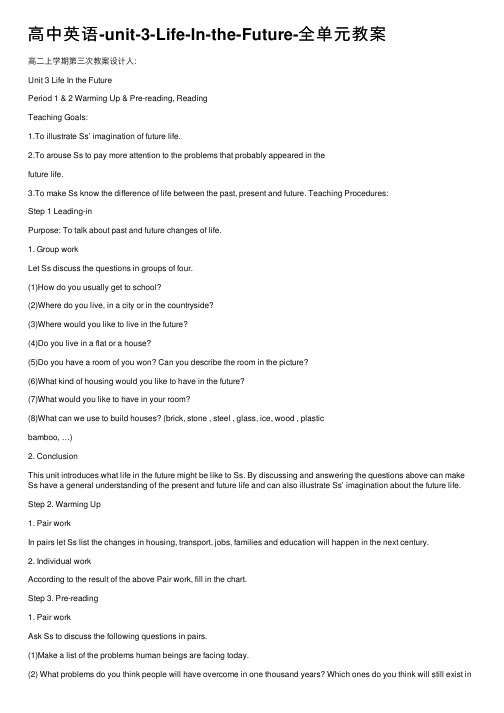
⾼中英语-unit-3-Life-In-the-Future-全单元教案⾼⼆上学期第三次教案设计⼈:Unit 3 Life In the FuturePeriod 1 & 2 Warming Up & Pre-reading, ReadingTeaching Goals:1.To illustrate Ss’ imagination of future life.2.To arouse Ss to pay more attention to the problems that probably appeared in thefuture life.3.To make Ss know the difference of life between the past, present and future. Teaching Procedures:Step 1 Leading-inPurpose: To talk about past and future changes of life.1. Group workLet Ss discuss the questions in groups of four.(1)How do you usually get to school?(2)Where do you live, in a city or in the countryside?(3)Where would you like to live in the future?(4)Do you live in a flat or a house?(5)Do you have a room of you won? Can you describe the room in the picture?(6)What kind of housing would you like to have in the future?(7)What would you like to have in your room?(8)What can we use to build houses? (brick, stone , steel , glass, ice, wood , plasticbamboo, …)2. ConclusionThis unit introduces what life in the future might be like to Ss. By discussing and answering the questions above can make Ss have a general understanding of the present and future life and can also illustrate Ss’ imagination about the future life. Step 2. Warming Up1. Pair workIn pairs let Ss list the changes in housing, transport, jobs, families and education will happen in the next century.2. Individual workAccording to the result of the above Pair work, fill in the chart.Step 3. Pre-reading1. Pair workAsk Ss to discuss the following questions in pairs.(1)Make a list of the problems human beings are facing today.(2) What problems do you think people will have overcome in one thousand years? Which ones do you think will still exist inAD 3008?Suggested Answers:①The first problem I would like to point out is the decline of morality.(道德沦丧)②The second problem is the racial bias problem. (种族歧视)③The third problem , which is a most serious problem , is the rapid depletion of resources on the Earth. (资源匮乏)④Now I come to the fourth problem, the problem of the large gap between the poor and the rich . (贫富悬殊)⑤The fifth problem is the pollution problem.(环境恶化)⑥Now I would like to talk about the sixth problem, the expensive arms race problem. (军备竞争)。
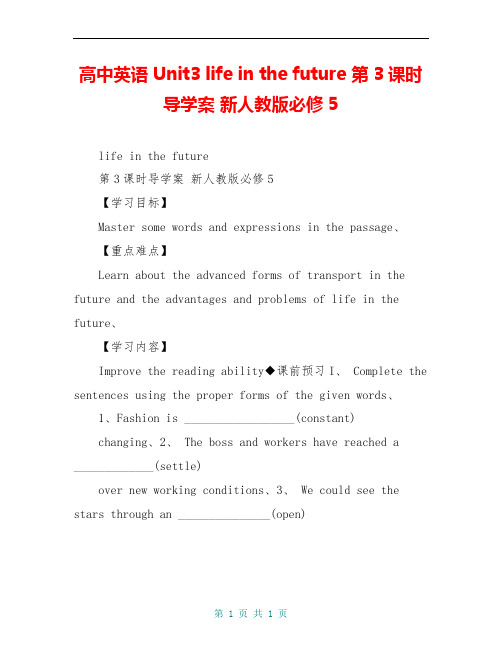
高中英语 Unit3 life in the future 第3课时导学案新人教版必修5life in the future第3课时导学案新人教版必修5【学习目标】Master some words and expressions in the passage、【重点难点】Learn about the advanced forms of transport in the future and the advantages and problems of life in the future、【学习内容】Improve the reading ability◆课前预习I、 Complete the sentences using the proper forms of the given words、1、Fashion is __________________(constant)changing、2、 The boss and workers have reached a_____________(settle)over new working conditions、3、 We could see the stars through an _______________(open)in the roof、4、 Our school is located in very pleasant _____________ (surrounding)、5、 Astronauts in flight must __________________(adjustment)to weightlessness、II、 Translate the phrases into Chinese and master them、 (A层)1、take up _________2、 be similar to ____________3、 be well-known for________4、 lack of____________5、 as though/as if_________6、 in no time___________7、be back on one’s feet______8、 catch/lose sight of________9、 sweep up_________10、 remind sb of sth__________11、speed up________12、slide into ________ ◆ 课堂学习I、自主合作(一)Reading comprehension、1、What is the main idea of the passage?A、First impression about Li Qiang’s travel to the future、B、 How to travel to the future、C、 What the future life will be like、D、 An exciting experience、2、 According to the passage, why did Li Qiang take this future tour?A、 Because he was curious about the year AD3008、B、 Because he won a prize last year which offered this trip、C、 Because his parents were good friends with Li Mengxi、D、 Because his parents offered him a lot of money、3、 The author and his friends were safely transported into the future in a _________、A、 time capsuleB、 hovering carriageC、 flying chairD、 plane4、 What did the author feel in the first few days?A、 He was upset and comfortable、B、 He felt frightened、C、 He suffered a lot of pain、D、 He felt uneasy and not sure、5、 What was the room like?A、 It was large, clean with broken wall、B、 The walls are colored and moveable、C、 There are pipes sending oxygen the room needs、D、 Tables and chairs are placed against the wall、6、 From the passage we can infer that__________、A、 Wang Ping often travels to the future、B、 Li Qiang has been to the future twice、C、Li Qiang’s parents didn’t agree to his travel、D、People in the future don’t have to eat food、7、Which is the right order of the incidents happening on Li Qiang’s travel?a、 I was transported into the future in a comfortable time capsule、b、 I had my first try to master a hovering carriagec、 I won a prize to travel to the year AD3008、d、I arrived at Wang Ping’s house and everything in it made me surprised、e、 I put on the mask and felt better in no time、A、 a-b-c-d-e;B、 b-a-d-c-e;C、 c-a-e-b-d;D、 d-e-b-c-aII、 Please match the main idea of each paragraph(B层)Paragraph1A、 The journeyParagraph2B、Staying in Wang Ping’s homeParagraph3C、 How I came to take a time traveljourneyParagraph4D、 My impressions of life1000 years into the futureIII、 Read the text carefully and then fill in the blanks about the details of Li Qiang’s future tour、 In___________________:◆ The seats were ________________and we slept after a calming drink、◆ The capsule began swinging gently sideways as we__________ ___________ and dreaming、In the hovering carriage:◆It is driven by computer、◆By bending and _____________down in our seat, you can move swiftly、◆I ______________ Qang Ping whenwe reached what _______________ a large market because of too many carriages flying by _______________ 、Atho me:◆It is a large bright clean room、◆It had a _____ wall, a brown floor and soft lighting、◆The wall moved —spare part3、电子邮件的开头和结尾已为你写好(不计入你所写词数);4已给出的电子邮件的开头和结尾不得抄入答题卡。
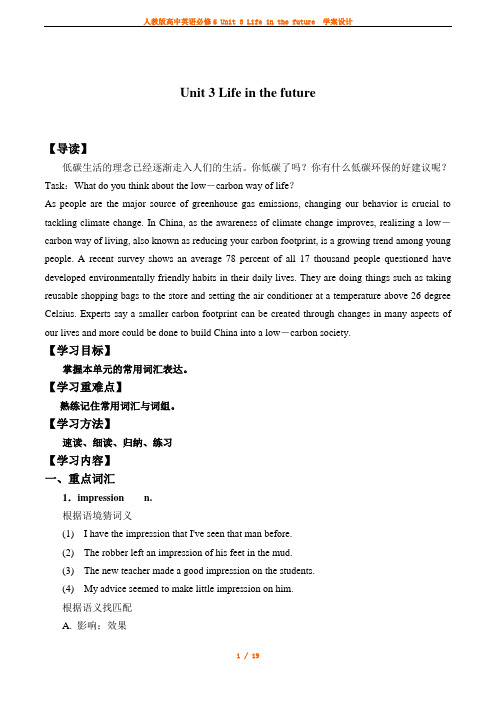
人教版高中英语必修5 Unit 3 Life in the future 学案设计Unit 3 Life in the future【导读】低碳生活的理念已经逐渐走入人们的生活。
你低碳了吗?你有什么低碳环保的好建议呢?Task:What do you think about the low-carbon way of life?As people are the major source of greenhouse gas emissions, changing our behavior is crucial to tackling climate change. In China, as the awareness of climate change improves, realizing a low-carbon way of living, also known as reducing your carbon footprint, is a growing trend among young people. A recent survey shows an average 78 percent of all 17 thousand people questioned have developed environmentally friendly habits in their daily lives. They are doing things such as taking reusable shopping bags to the store and setting the air conditioner at a temperature above 26 degree Celsius. Experts say a smaller carbon footprint can be created through changes in many aspects of our lives and more could be done to build China into a low-carbon society.【学习目标】掌握本单元的常用词汇表达。
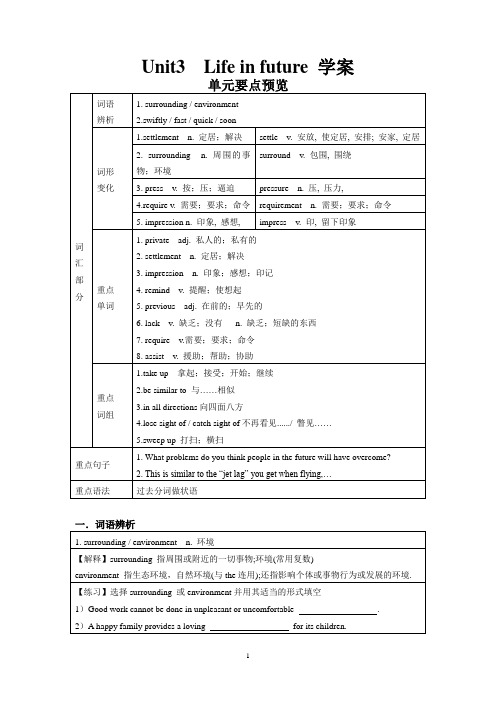
Unit3 Life in future 学案一.词语辨析二.词形变化三.重点词汇1. private adj. 1)私人的;个人的2)私下的, 保密的;[典例]1) When children grow up, they are eager to get private rooms for themselves.当孩子长大了,他们都渴望有自己的房间。
2) I wish to have a private talk with you. 我想私底下和你谈谈。
[练习] 汉译英1)老师应该允许孩子具有自己的观点。
_______________________________________________________________________________ 2)私下讨论后,他们达成令人满意的协议。
_______________________________________________________________________________2. settlement n. 1) 定居点[C] 2)(解决纷争的)协议[C] 3) 解决,处理[U][典例]1) The Indians often attacked the settlements of the colonist.印地安人经常袭击殖民者的定居点。
2) The strikers and the employers have reached a settlement over new working conditions.罢工者已经与顾主就新的工作条件达成了协议。
3) After the settlement of our differences, we became friends. 消除分歧后,我们成了朋友。
[重点用法]settle v. 定居come to a settlement 解决; 决定; 和解settle in Canada 定居加拿大settle down 安顿下来:过稳定有序的生活:[练习] 汉译英1) 他与家人安顿下来务农_______________________________________________________________________________ 2) 她丈夫死后,她定居北京_______________________________________________________________________________3. impression n. 印;印痕;印记;印象;意念;概念[典例]1) Y our performance gave me a strong impression.你的表演给我留下了很深的印象。

Life in the future教课方案Analysis of the teaching material教材剖析本单元教课内容为人教版Module 5 Unit 3 Life in the future 。
本单元的中心话题是“将来生活” ,教材内容为学生供给了想象的空间,旨在培育学生展望将来的能力,经过对现实生活与将来生活的对照,唤醒学生掌握此刻,珍惜此刻,爱惜环境,保护自然的意识。
Teaching goals 教课目的1. Target language 目口号言a.要点词汇和短语constantly, remind, vehicle, carriage, bathroom, temple, private, settlement, impression, constant, jet, previous, tablet, capsule, opening, surrounding, lack, ache,b.要点句式This is similar to ..., but it means ... P17Well- known for ..., his parents pany’,comalled “Future Tour”, transported me safely into the future in a time capsule.. P182. Ability goals 能力目标Enable the Ss to talk about the life in the past, at present and in the future.3. Learning ability goals 学能目标Help the Ss learn how to describe the life in the past, at present and in the future. Teaching important&difficult points教课重难点Compare life in the past, at present and in the future.What is life in the future like? What changes will take place?Teaching methods 教课方法Fast and careful reading; asking and answering activity; individual, group work. Teaching aids 教具准备A computer and a projector.Teaching procedures&ways教课过程与方式Step 1 Greetings and Lead-in1.The teacher can start with daily greetings and try to lead in some words in this unit.Q1: Where do you come from? Do you live in the downtown or in the countryside? 2.Q2: No matter where you live, I am wondering how do you usually go to school? 3.Now let’s take a look at the screen to learn about the development of all the means of transportation.4.Q3: What will the future means of transportation be like? (Time travel)【设计说明】由平时问候开启话题,经过发问学生展望将来,引出跨时空旅游,进而进入阅读文章的办理与学习。
Unit 3 Life in the futureⅢ. 教材分析与教材重组1. 教材分析本单元以“Life in the future”为中心话题,旨在通过本单元的学习,让学生大胆发挥想象,对人类今后的生活环境,生活方式进行猜测,并在此基础上,对人类的种种活动进行反思,提倡环保生活意识。
同时让学生学会过去分词作定语和作状语的不同用法。
最后让学生将本单元所讨论的话题和推测手法相结合,学习怎样写report。
1.1 Warming Up 部分利用一个关于“住”和“行”的对比研究表格引导学生回顾过去,认识现在和展望未来。
通过这一活动,引发学生对过去,现在和未来的思考,使学生对将要阅读的文章有个知识准备。
1.2 Pre-reading 部分让学生充分运用发散思维,先列举当今世界人类面临的一些突出问题,然后要求学生思考为什么会产生这些问题,这些问题中哪些在未来社会仍然可能存在,哪些将会被克服,哪些将会恶化。
为下面的阅读做了铺垫。
1.3 Reading 部分通过一封发自未来的电子邮件,讲述了作者Li Qiang怎样安全到达“未来世界”,他对“未来世界”的印象,以及“未来世界”的日常生活方式和交通工具情况。
阅读时要把重点放在“未来世界”生活与当今生活的不同点上。
1.4 Comprehending 部分设计了三个教学活动来加深学生对Reading部分的理解。
第一个活动要求学生通过阅读找出“未来世界”在以下几个方面的变化:跨时空旅行,交通,住房,城镇环境和空气质量。
接着让学生在此基础上得出自己的结论,哪些变化好,哪些变化不好,并说明理由。
第二个活动要求学生通过阅读来判断Li Qiang对“未来世界”的态度是乐观的还是悲观的。
学生要在文中找出支持自己观点的论据,尽可能说服别人。
第三个活动让学生想象一下Li Qiang将会去参加哪些活动。
这样既鼓励学生展开丰富的想象,又为Using Language部分的语篇学习做了铺垫。
Unit 3Life in the future中心1. impressionn.印痕;印;印象;感想常用构:have an impression of sth./doing sth.(做)某事有印象make an impression on sb.某人留下印象make no impression on⋯⋯无影响/成效give sb.a favorable impression某人留下好印象an impression of one’s foot某人的脚迹Your performance gave me a strong impression.你的表演我留下了很深的印象。
What I said made no impression on him.我的他不起作用。
想拓展impress v.留下印象impress sth.on/upon one’s mind把⋯⋯牢在心上能手招填空She spoke very confidently because she wanted to make a great on her employer at the first time.A. InfluenceB. pressureC. ImpressionD. Effect分析 : C。
make an impression on sb.某人留下印象。
2. lackv.& n . 缺乏;缺乏的西注意: lack 作名,后常接 of 。
lack 作,既可作及物,也能够作不及物,作不及物,后常接for 或in 。
lack 不用于被。
常用构:lack sth.缺乏某物lack for sth.缺乏;需要for/through lack of...因缺乏⋯⋯no lack of...不缺乏a/the lack of ...⋯⋯的缺乏He didn ’t go there becau se he lacked courage.他没去那边,因他缺乏勇气。
Book5 Unit1 Period1【学习目标】:1. 掌握本课重点单词和短语 2. 掌握文中重点句子Ⅰ.按照课文原文完成下列句子。
1. He became inspired when he thought about helping ordinary people __________ cholera.2. So many thousands of terrified people died ________ there was an outbreak.3. He knew that cholera would _________ be controlled _______ its cause was found.4. The second theory suggested that people ______this disease into their bodies with their meals.5. So when another outbreak _______ (hit; strike)London in 1854, he was ready to begin his_________(research;enquiry).6. In two _______ (special; particular) streets, the cholera outbreak was so severe that more than500 people died in ten days.7. It seemed that the water was ___________ (scold; blame) .8. Both she and her daughter die ____ (of; from) cholera after drinking the water.9. _______ its course ______ its cure was understood. (既不……也不……)10. He found that it came from the river __________ (污染) by the dirty water from London.11. He_________(立刻) told the astonished people in Broad Street to remove the handle fromthe pump so that it could not be used.12. Soon ______(后来) the disease slowed down13. He found supporting evidence from two other deaths ___________ (与……有关联)theBroad Street outbreak.14. He was ___________(决定) find out why.15. To______ this _______ happening again(阻止), John Snow suggested that the source of allthe water supplies _____________(检测).Ⅱ. 阅读理解ABlind imitation (模仿)is self-destruction. To those who do not recognize their unique worth, imitation appears attractive; to those who know their strength, imitation is unacceptable.In the early stages of skill or character development, imitation is helpful. When I first learned to cook, I used recipes (菜谱) and turned out some tasty dishes. But soon I grew bored. Why follow someone else’s way of cooking when I could create my own? Imitating role models is like using training wheels on a child’s bicycle; they help you get going, but once you find your own balance, you fly faster and farther without relying on them.In daily life, imitation can hurt us if we subconsciously (下意识地) hold poor role models. If, as a child, you observed people whose lives were bad, you may have accepted their fear and pain as normal and gone on to follow what they did. If you do not make strong choices for yourself, you will get the results of the weak choices of others.In the field of entertainment, our culture glorifies celebrities. Those stars look great on screen. But when they step off screen, their personal lives may be disastrous. If you are going to follow someone, focus on their talent, not their bad character or unacceptable behaviors.Blessed is the person willing to act on their sudden desire to create something unique. Think of the movies, books, teachers, and friends that have affected you most deeply. They touched you because their creations were motivated by inspiration, not desperation. The world is changed not by those who do what has been done before them, but by those who do what has been done inside them. Creative people have an endless resource of ideas. The problem a creator faces is not running out of material; it is what to do with the material knocking at the door of imagination.Study your role models, accept the gifts they have given, and leave behind what does not serve you. Then you can say,” I stand on the shoulders of my ancestors’tragedies and declare victory, and know that they are cheering on.1. Imitation proves useful when you_________.A. know you are uniqueB. lose the balance of lifeC. begin to learn something newD. get tired of routine practice2. To avoid the bad result of imitation, we should________.A. forget daily fear and painB. choose the right exampleC. ask others for decisionsD. stay away from stars3. According to the author. The world moves on because of those who are_______.A. desperate to influence others with their knowledgeB. ready to turn their original ideas into realityC. eager to discover what their ancestors didD. willing to accept others’ideas4. The trouble a creator faces is __________.A. the lack of strong motivationB. the absence of practical ideasC. how to search for more materialsD. how to use imagination creatively5. What is the author’s purpose in writing this passage?A. To highlight the importance of creatively.B. To criticize the characters of role models.C. To compare imitation with creation.D. To explain the meaning of success.BMy house is made out of wood, glass and stone. It is also made out of software.If you come t o visit, you’ll probably be surprised when you come in someone will give you an electronic PIN (个人身份号码) to wear. This PIN tells the house who and where you are. The house uses this information to give you what you need. When it’s dark outside, the PIN turn s on the lights nearest to you, and then turns them off as you walk away from them. Music moves with you too. If the house knows your favorite music, it plays it. The music seems to be everywhere, but in fact other people in the house hear different music or no music. If you get a telephone call, only the nearest telephone rings.Of course, you are also able to tell the house if you want something. There is a home control console,a small machine that turns things on and off around you.The PIN and the console are new ideas, but they are in fact like many things we have today. If you want to go to a movie, you need a ticket. If I give you my car keys, you can use my car. The car works for you because you have the keys. My house works for you because you wear the PIN or hold the console.I believe that ten years from now, most new homes will have the systems that I’ve put in my house. The systems will probably be even bigger and better than the ones I’ve put in today.I like to try new ideas. I know that some of my ideas will work better than others. But I hope that one day I will stop thinking of these systems as new, and ask myself i nstead, “How will I live without them?”6. What does the passage mainly discuss?A. How to develop a new system.B. The function of the PINC. A home for the futureD. Easy life in the future.7. What’s the purpose when the writer wrote the fourth paragraph?A. To let readers know why his ideas are newB. To explain what the functions of the PIN and the console areC. To explain the importance of the PIN and the console.D. To let readers know how special his house is.8. The writer’s new house is different from ordinary ones mainly because _______.A. it has your favorite music following youB. you can make a telephone call anywhereC. the writer is able to change his new idea into practiceD. it has been controlled by computers9. What is the writer most likely to be according to the passage?A. An IT expertB. A famous doctorC. An idealistD. An experienced teacher。
高二英语学案必修五Unit3Lifeinthefuture导学案Unit 3 Life in the futurePeriod 1: Warming up and Pre-reading and ReadingLearning Goals:1. Develop student’s reading ability and let them learn different reading skills.2. Students know about what life in the future might be like and stimulate their imagination.Before class(课前自主学习)I.重点单词及短语1. 改变,变化2. 期待;期望3. 在某人的生活中4. 在……下面5. 一千年之后6. 方面7. 进行讨论 8. 做笔记;记笔记9. 立刻;很快 10. 被…打击;伤害II. 难点句式突破1.What changes do you expect to see in your life in one thousand years’ time?(翻译___________________________________________________________ 2.Below are some of the main aspects of life today.(翻译)___________________________________________________________ In class(合作探究)Step 1 Leading inStudents discuss the following questions.1.How did people travel 1000 years ago?2.How do you usually get to school?3.Do you have a room of your own?Step 2 Warming upStudents finish the tasks on page17 in the books.Step 3 Pre-readingStudents finish the tasks on page17 in the books.1.SkimmingSkim the text and finish the following tasksMatch main ideas with paragraphsPara 1: A. He was confused by the new surroundingsPara 2: B. He arrived at Wang Ping’s home in the f uturePara 3: C. He was worried about the journeyPara 4: D. The journey was completed and they arrived2.ScanningSkin the text and fill in the blanks according to the reading material3. Careful readingStep1.Read the passage again and make the best choices.1. The author and his friends were safely transported into the future in a ________.A. time capsuleB. hovering carriageC. flying chairD. plane2. What did the author feel in the first few days?A. He was upset and comfortableB. He felt frightenedC. He suffered a lot of painD. He felt uneasy and not sure3. What was the room like?A. It is large, clean with broken walls.B. The walls are colored and moveable.C. There are pipes sending oxygen the room needs.D. Tables and chairs are placed against the wall.4. From the passage we can infer that________A. Wang Ping often travels to the futureB. Li Qiang has been to the future twiceC. Li Qiang’s parents didn’t agree to this travelD. People in the future don’t have to eat food5. Which of the following can replace the title of this passage?A thrilling time travel trip B. Feelings in the time travel tripC. Visiting Wang Ping’s homeD. Future life and future tour6. Which of the following statements is NOT true?A. Wang Ping suffered fro m “time lag” when he traveled in the time capsule.B. The prize offered Li Qiang a chance to travel to the year 3008.C. Li Qiang lost sight of Wang Ping in a large market.D. Wang Ping’s home was equipped with much advanced furniture.Step 4 当堂达标检测(summary)Dear Mum and Dad,I have to remind myself that I am up this prize and I’m reallyin the year of 3008. I suffered from “time lag” that I keep getting flashbacks from time period. We climbed in the capsule through a small . It was very comfortable. A few minutes later, the journey was completed and we had arrived. At first the were hard to . Because the of fresh air, I’d got a headache, so I put on a mask. Then I followed Wang Ping to collect a hovering carriage driven by computer. These carriages float above the ground and bydown in the seat, we can move swiftly. Wang Ping showed me how to use it, but I lost of him when we reached a place where many carriages flew by in all directions. Later we arrived at a strange-looking house which had a green wall made of trees. A table and some chairs couldrise from under the floor by flashing a on a computer screen.I was exhausted that night andfell asleep quickly.Your loving son,Li QiangAfter class:完成新教材新学案 page29-30Unit 3 Life in the futurePeriod 2: Language PointsLearning Goals:1. Students read the passage and know about what life in the future might be like.2. Students talk about the advantages and problems of life in the future.Before class(课前自主学习)I. 重点单词(1)方面;层面(2)影响(3)提醒(4)不断地)(5)飞行时差反应) (6)闪回;倒叙(7)在前的;早先的) (8)闪烁的;闪光的II. 重点短语(1)因此(2)从事;拿起(3)使回想或意识到(4)担心(5)跟……相似(6)不安的;怀疑的(7)从……得到(8)遭受;遭遇III. 难点句式突破1. I have to remind myself constantly that I am really in AD 3008.(翻译)___________________________________________________________ 本句中that引导从句。
Unit3 Life in the future第一篇课文学案课题: Unit3 Life in the future学习目标: 课文理解及语言点的掌握教学重点:课文理解及语言点的掌握课前准备:请同学们提前阅读学案内容,了解课堂上要完成的任务,并做好以下准备:预习学案,熟读课文Teaching Steps :(教学步骤)Step 1:Have a check ----复习上节课内容Step2:Learn the new text and do the following questions.(熟读课文,完成以下问题)I. Fast reading:What ’s the main idea of the passage?_____________________________________________________________________II. Detail reading:Now try to find out what happened to Li Qiang before, during and after the journey. Before the journey : Li felt ___________ and __________ at first, as a result he suffered from _______.During the journey(1):Li was transported safely into the future in a ________.During the journey(2):__________ by the new surroundings, Li was hit by the _____ of fresh airand his head ______. After the journey(1):Arriving home Li was________ into a large bright, clean room with a ______ wall, a_____ floor and _____ lighting.After the journey(2):__________, he slid into bed and _____ fast ________.III. Read Para 1 and judge the sentences true or false.1. The writer’s prize is a future travel.2.For the first few days the writer felt settled.3.During his journey he suffered from “jet lag”.4.Wang Ping was his friend as well as his guide.5.The writer gave Wang Ping some green tablets, which helped a lot.6. They were transported into the future in a time capsule.Read Para 2 then fill in the blanksThe six of us were called to the _____ together and climbed in _______ the round opening. The seats were _______ and after a ______ drink, which made us_____. The capsule ______ as we lay ______ by our dreams. Sounds came from ______ our feet as we slowly from the ground, ______ gently. A few minutes later the journey was ______ and we had arrived. I was still on the _____ but one ________ years in the future.Read Paragraph 3 and answer questions:1. How did I feel as soon as I was in the new surroundings ?____________________________________________________________2.. How did people travel in the year AD 3005?______________________________________________________________3. Who drove the carriages?______________________________________________________________Step3:learn the language points(学习课文中的语言点)1. I still cannot believe that I am taking up my prize that was won last year.我还是无法相信我是在接受去年获得的这个奖励。
take up 1)接受(建议或挑战) He took up challenge with courage.2)开始从事…,开始承担He decided to take up photograph as his career.3)(把未完之事等)继续下去Now it’s your time to take up the story.4)占去(时间、空间)Writing the paper took up most of the weekend.take off脱下take out拿出take over 接管,代替take in吸收,理解,领会,欺骗2.. I have to constantly rub my eyes to remind myself that I have travelled to the year AD 3005.我不停地擦眼睛提醒自己,我真的进入了公元3005年了。
(1)constantly adv. 经常地,反复地constant adj.经常的,不变的,忠贞的The old man’s hands shook constantly.老人的手不停的颤抖.I a m Jay’s constant fan and supporter.我是周杰伦忠实的粉丝和支持者。
2)remind vt.使记住,提醒; 使想起;使记起remind sb. of sb./sth. 使某人想起某人/某事remind sb. to do sth. 提醒某人做某事remind sb. that/what/how…提醒某人….The film reminded him of his school life.这部影片使他回想起学生时的生活。
Please remind him to meet at the school gate on the outing day.请提醒他秋游那天在校门口集中。
He ~ed me that I haven’t had my breakfast.他提醒我我还没吃早餐。
3.As a result, I suffered from “time lag”.结果我得了时间滞后症。
1)as a result 因此,结果as a result of由于result from起因于result in导致=lead to天下雪,因此她迟到了.It snowed, as a result, she was late.2)suffer from 遭受,患.......病,因(病、贫困等)困她为贫困所扰.She suffers from poverty.4.These hovering carriages float above the ground and by bending and pressing down on thedriving strict strongly one can move swiftly.这些气垫车是在地面上漂浮着的,只要用力把操作杆打弯或压下,你就可以迅速地移动。
by 介词+doing sth ,表示手段,方式。
They put out the fire by pouring water on it.他们泼水扑灭了火。
swiftly adv.迅速的,敏捷的辨析:swift侧重动作的轻快,顺利;rapid 侧重事物的进展迅速,表示动作快可与swift 互换;quick侧重动作的快,与swift可互换;fast 侧重速度的快.5.He was swept up into the center of them and my link with him was broken as I was carried up to the top of a high building nearby.他被卷入到这群车队中去了,而我被带到了附近的一个高楼顶,我们断了联系。
Sweep up 打扫,引申为"横扫,掠过"The leaves were swept up into the air by the wind.6. Exhausted, I slid into bed and fell fast asleep.实在累坏了,我溜上床很快就睡着了。
slide v. 偷偷地移动;潜行;(使)滑船滑入水中.The ship slid (down) into the waterexhausted 过去分词作状语,表示与主句中动作伴随发生的状况,类似:Confused by the new surroundings, I was hit by the lack of fresh air.新的环境把我得心烦意乱的,由于缺乏新鲜空气,我感到受不了。
Step5:当堂检测Choose the best answers according to the text.(根据课文内容,选择)1. The prize Li Qiang won last year was _______________.A. a large bright, clean roomB. a time capsuleC. the money for a future tourD. to experience the life in the future2. Why was Li Qiang unsettled for the first few days?A. Because he was uncertain about what might happen during the future tour.B. Because he became so excited whenever he thought of the future tour.C. Because he couldn’t wait to make the future tour.D. Because he hadn’t decided whether to take the risk of experiencing the future tour.3. Which of the follow statements is NOT true?A. Li Qiang got a headache because of lack of fresh air.B. It took Li Qiang only a short time to arrive in the future.C. It seemed very difficult for Li Qiang to learn to drive a hovering carriage.D. There was more oxygen inside Wang Ping’s home than outside.4. From the text we can see that __________.A. there will be no lack of foodB. there will be less oxygenC. there will be traffic jamsD. there will be no lack of living space。